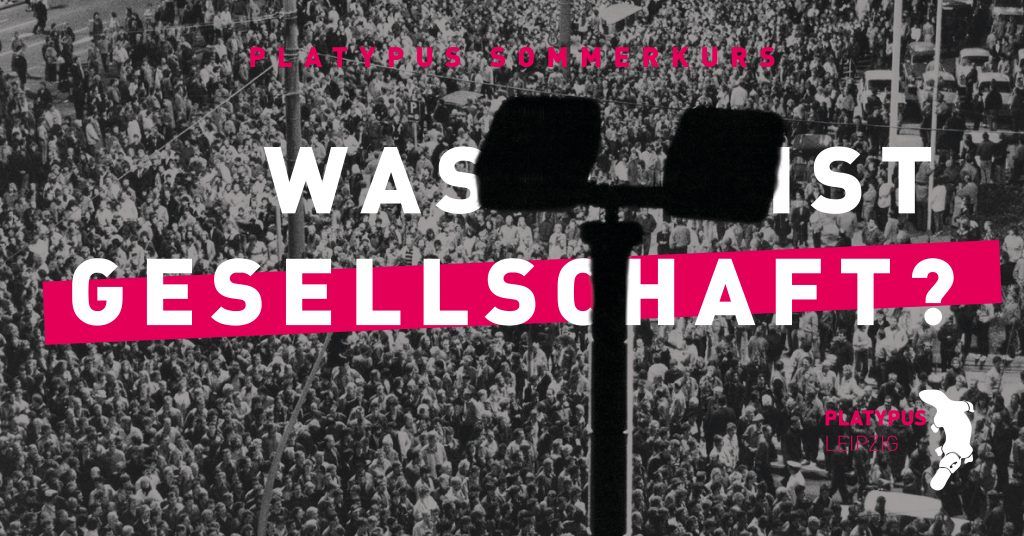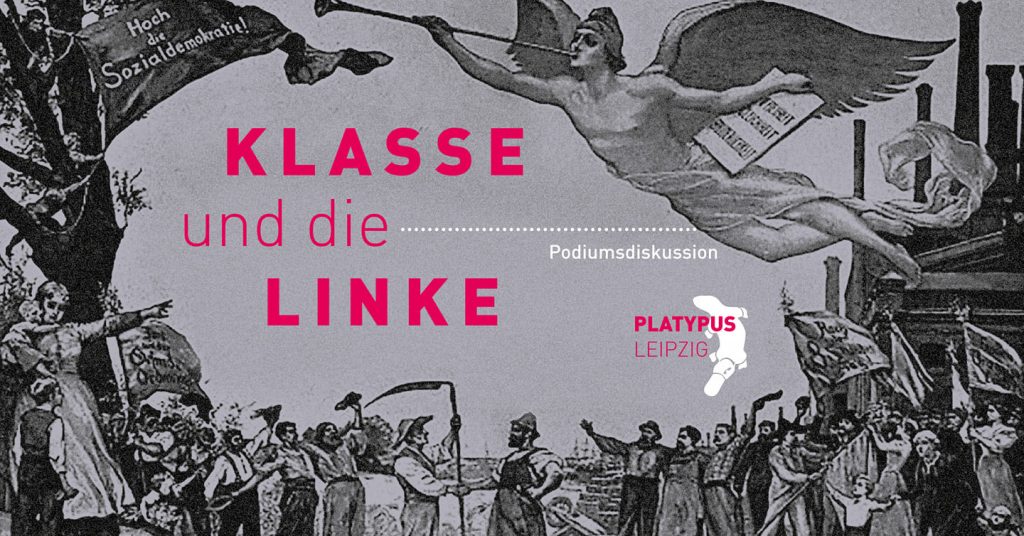Die umstrittenste Annahme des Marxismus ist die Diktatur des Proletariats. Und in der Tat bildet sie das, wodurch sich der Marxismus politisch, ideologisch und theoretisch, intellektuell, praktisch und organisatorisch auszeichnet. Der Tod der Linken misst sich an der Abkehr von dieser These.
Lesekreis zu Klassischer Soziologie

Die Texte werden im Voraus gelesen und dann zusammen diskutiert. Alle sind herzlich willkommen!
Zeit: Mittwochs 19 - 22 Uhr [in Woche 4 am Dienstag!]
Ort: Liebknecht-Haus, Braustraße 15, 04107 Leipzig
● vorausgesetzte Texte
+ zusätzliche, empfohlene Texte
Vorausgesetzte Hintergrundlektüre:
• Chris Cutrone, "Back to Herbert Spencer! Industrial vs. militant society" (2016) [audio]
Empfohlene, zusätzliche Hintergrundtexte:
+ Adorno, "Static and Dynamic as Sociological Categories" (1961)
+ Adorno, Introduction to Sociology 1962 lectures
+ Adorno, Philosophical Elements of a Theory of Society 1964 lectures
+ Adorno, Philosophy and Sociology 1960 lectures
Einleitende Texte:
• Adorno, “Gesellschaft” (1965; in: Adorno, Soziologische Schriften I; gesamtes Buch kann auf Anfrage per Email verschickt werden)
• Benjamin Constant: „Von der Freiheit des Altertums, verglichen mit der Freiheit der Gegenwart”(1819)
Schaubilder und Begriffe:
+ Capital in history timeline and chart of terms
+ Being and becoming (freedom in transformation) / immanent dialectical critique chart of terms
+ Capitalist contradiction chart of terms
+ Commodity form chart of terms
+ Reification chart of terms
Woche 1: 17. August 2022
• Adorno, “Gesellschaft” (1965; in Adorno, Soziologische Schriften I)
+ Chris Cutrone, "Gillian Rose's 'Hegelian' critique of Marxism" (2010)
• Gillian Rose, Hegel Contra Sociology (1981/95) Auswahl: Preface for 1995 reprint, 1. The Antinomies of Sociological Reason, 7. With What Must the Science End?
Woche 2: 24. August 2022
• Epigraphe über moderne Geschichte und Freiheit von Louis Menand (über Marx und Engels), und Karl Marx, über das „Werden“ (Aus den Grundrissen, 1857-58)
• Max Weber, Die protestantische Ethik und der Geist des Kapitalismus (1904-1905) Auswahl: Vorbemerkung, I. Teil Kapitel 1-3, II. Teil Kapitel 2 (+ Kapitel 1) [wird per Email verschickt, bitte anfragen]
Woche 3: 31. August 2022
• Auguste Comte, Introduction to Positive Philosophy (1830-42) I. The nature and importance of the positive philosophy
• Comte, The Positive Philosophy of Auguste Comte vol. III Auswahl: Bk. VI. Social Physics pp. 1-11, 199-216, 277-344 [PDF Positive Philosophy of Comte Auswahl]
• Comte, A General View of Positivism Auswahl: Ch. II. The Social Aspect of Positivism pp. 63-78, Ch. VI. The Religion of Humanity pp. 340-426 [PDF General View of Positivism Auswahl]
+ Chris Cutrone, "Ends of philosophy" (2018)
Woche 4: 06. September 2022
+ Chris Cutrone, "Back to Herbert Spencer! Industrial vs. militant society" (2016) [audio]
• Herbert Spencer, Principles of Sociology Vol. I Auswahl: Part I The Data of Sociology Ch. I-IV pp. 3-40 [als PDF] und Part II The Inductions of Sociology Ch. I-II pp. 447-462 [als PDF]
• Spencer, On Social Evolution: Selected Writings Auswahl: IV 15–16 Societal Typologies, Militancy and Industrialism und V 18–19 Ceremonial and Political Institutions
• Spencer, The Man Versus the State Auswahl: VI The Great Political Superstition [als PDF]
Woche 5: 14. September 2022
• Emile Durkheim, "The principles of 1789 and sociology" (1890); V Social Creativity Ch. 11-12; alles in On Morality and Society
• Durkheim, Die elementaren Formen des religiösen Lebens (1912), Einleitung
Woche 6: 21. September 2022
• Durkheim, Chapter 10. "The dualism of human nature and its social conditions" (1914), Ch. 4. "Individualism and the intellectuals" (1898); III. The Evolution of Morality Ch. 6, in On Morality and Society
• Durkheim, Über soziale Arbeitsteilung (1893) Auswahl: Vorwort zur ersten Ausgabe [gesamte PDF auf englisch] und Einführung
Woche 7: 28. September 2022
• Durkheim, III. The Evolution of Morality Chapters 7-9, in On Morality and Society
• Durkheim, Über soziale Arbeitsteilung, Vorwort zur zweiten Ausgabe
Woche 8: 05. Oktober 2022
• Frankfurter Schule, Aspects of Sociology (1956) Auswahl: Preface by Horkheimer and Adorno, Chapters I-VI, XII [deutsche Version wird auf Anfrage zugeschickt]
• Adorno, "Gesellschaft" (1965)
+ Adorno, "Static and Dynamic as Sociological Categories" (1961) [deutsche Version wird auf Anfrage zugeschickt]
Für Luxemburg lag das Wesen des Sozialismus in der Verbindung von „revolutionärer Tatkraft und weitherzigster Menschlichkeit“.1 Sie hat der Linken für das 20. Jahrhundert eine Aufgabe hinterlassen gehabt, an der diese scheiterte: die Einheit von Sozialismus und Demokratie. Dafür gibt es viele Ursachen. Ich will nur auf eine einzige Ursache eingehen – es ist das Verständnis von Sozialismus und von Demokratie, mit dem die marxistische Linke in das 20. Jahrhundert gegangen ist.
Am 10. April 2021 organisierte die Platypus Affiliated Society eine virtuelle Podiumsdiskussion mit Frigga Haug (feministische Marxistin), Sascha Stanicic (Sozialistische Organisation Solidarität), Gert Meyer (Historiker) und Stefan Hain (Platypus Affiliated Society), um über den Marxismus der Rosa Luxemburg zu diskutieren.
Freitag, 08. Juli 2022, 19 Uhr im Pöge-Haus

Für Marxisten konnte die klassenlose Gesellschaft nur durch eine Übergangsphase, die Diktatur des Proletariats, erreicht werden. Das Proletariat und sein politischer Arm, die Partei, sollte die Führung der demokratischen Revolution übernehmen. Nach der Niederlage der Weltrevolution zu Beginn des 20. Jahrhunderts und vor allem mit dem Aufkommen der Neuen Linken in den 1960ern wurden zunehmend unterdrückte und marginalisierte Gruppen zum revolutionären Subjekt erklärt.
Mit der Krise des Neoliberalismus scheint die Frage der Klasse wieder in Betracht gezogen zu werden.
Welche politische Bedeutung hatte der Klassenkampf im 19. und 20. Jahrhundert? Wer sollte die Gesellschaft führen und was bedeutet revolutionäre Führung? Welche Beziehung besteht zwischen der Linken und der Klasse? Was ist die Klasse für die Linke heute, und wie verhält sie sich zur Aufgabe, den Kapitalismus zu überwinden?
Sprecher*Innen:
- Ekkehard Lieberam
- Michael Fischer
- Jonathan Eibisch
Eine Veranstaltung von Platypus Leipzig.

